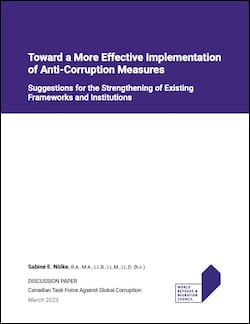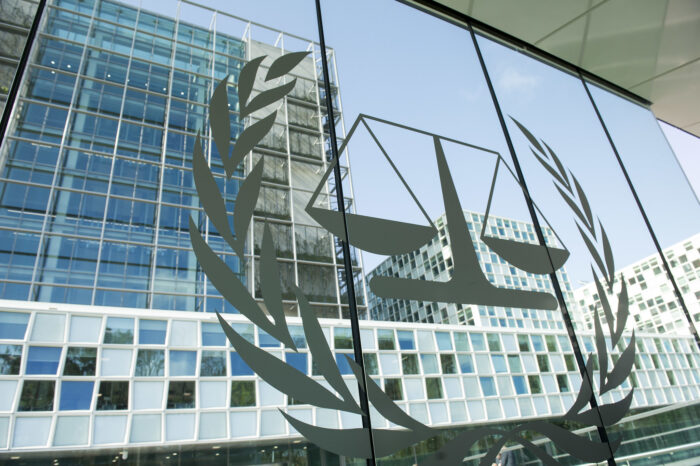Suggestions for the Strengthening of Existing Frameworks and Institutions
By Sabine Nölke
This discussion paper is part of a series of World Refugee & Migration Council publications on global anti-corruption measures including repurposing assets for the forcibly displaced. This work is supported in part through the Council’s Canadian Task Force Against Global Corruption.

Corruption is a criminal offence resulting in widespread economic distortions in less developed and industrialized states, which are felt equally, albeit to different effects. The global prevalence of corruption and its highly detrimental impact on sustainable development have made the UN Convention against Corruption (UNCAC) one of the few multilateral treaties with near-universal ratification[1]. And yet, implementation lags far behind avowed commitments — corruption continues to remove trillions of dollars annually from the legitimate global economy.
The present paper seeks to identify the most trenchant gaps in the implementation of States’ legal obligations in the fight against corruption and to offer some elements for practical and practicable solutions. It is not a research paper, nor does it purport to be a comprehensive overview of the international anti-corruption framework or an in-depth study of methodologies for combating corruption. The views and suggestions herein are based on the author’s discussions and engagements with practitioners, government officials, and members of civil society, as well as on decades of professional experience in pursuing meaningful results through multilateral engagement. In short, after listening to a number of consistent complaints and aspirations to proposed solutions as well as concerns those might trigger in turn, the author has put together a simple summary of her views together with recommendations on what measures might usefully be taken, given known political and other constraints.
After reviewing known implementation gaps and addressing the pros and cons of one proposed solution, an International Anti-Corruption Court, the author concludes that it would be ineffective to address corruption primarily through criminal prosecution. Redressing the economic distortions created by corruption can be more effectively achieved by taking away its profits and repurposing those for the benefit of the societies from which they were stolen. Asset seizure, confiscation, forfeiture, and repurposing would, moreover, serve to incentivize state action, while doing so through non-conviction-based forfeiture would significantly enhance the volume, speed, and impact of economic realignment.
Given the reluctance within the international community to create new institutions and frameworks, the author proposes to expand the capabilities of existing ones — in particular, the UN Office on Drugs and Crime and the Permanent Court of Arbitration — to address state capacity gaps in tracking, tracing, seizing, and forfeiture. Access to independent third-party direct assistance would reduce political considerations and assist states in identifying reliable channels for the return or repurposing of corruptly obtained assets. Resource requirements for the effective implementation of such measures are also considered.
The paper concludes with a series of concrete recommendations and an outline of the necessary international processes through which these proposals (and others) could be discussed at the expert level and placed before the international community for consideration and eventual adoption.
[1] As of 18 November 2021, UNCAC has 189 States Parties. Only the DPRK and Eritrea have neither signed nor ratified the treaty, while Syria has signed but not ratified.
Photo: UN Photo/Rick Bajornas
